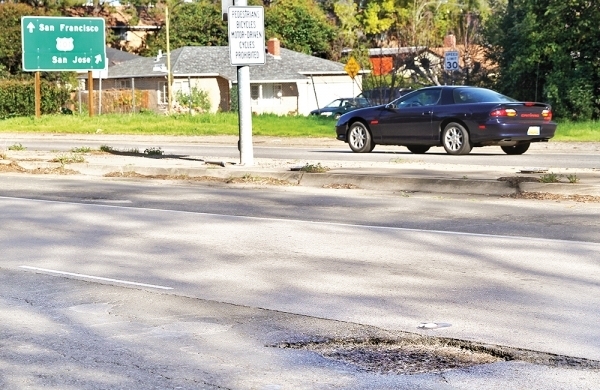As Palo Alto's elected leaders survey all the new laws coming out of Washington, D.C., and Sacramento, two strikingly different pictures emerge.
When it comes to the national level, the city is nervously awaiting the impacts of the Republican tax-reform plan, which may eliminate of tax-deductible status for private-activity bonds, which are often used to pay for housing and infrastructure.
But at the state level, officials are eagerly anticipating a fresh stream of funds from California's recently raised gas tax and housing bond, as well as potentially from a parks bond that state legislators are planning to place on the June ballot.
The City Council's Policy and Services Committee discussed both trends -- along with other legislation coming out of Washington, D.C., and Sacramento -- on Nov. 14, when it held its periodic meeting with the city's federal and state lobbyists. The committee also voted 4-0 at the meeting to reaffirm, and slightly modify, the city's legislative priorities, which fall into the categories of transportation, environmental sustainability, technology, housing, finances and public employment.
Steven Palmer, vice president of Van Scoyoc Associates, Palo Alto's federal lobbyist, named the Republican tax-reform effort as a high priority for his firm. The effort moved forward Nov. 15, when the House of Representatives approved its version of the tax-reform bill; Senate Republicans hope to pass their version before Christmas.
Palmer told the committee that his company has been working with a broad coalition of mayors and national groups to preserve the tax-deductibility of municipal bonds. Neither of the Republican tax bills eliminated this status, he said.
Yet he also noted that the House version of the tax bill eliminates tax deductibility for private-activity bonds, 80 percent of which are used for housing (the rest are for infrastructure, he said).
"At a time when President Trump and others talk about investing more money into infrastructure, it seems to be a step backwards," Palmer said. "There's a lot of pushback from municipalities in the state of California and elsewhere."
Other parts of the tax bill that Palmer said could have a big impact on Palo Altans is a proposed $10,000 cap on tax deduction from state and local property taxes; and a new $500,000 limit on mortgage-rate deductions (down from the current level of $1 million).
When it comes to airplane noise, one of Palo Alto's top issues of concern, there appears to have been some incremental progress, though no imminent solutions. Palmer said there is now greater recognition from the Federal Aviation Administration and federal legislators, particularly in the House, that the agency needs to improve its community-outreach efforts when changing plane routes.
At the same time, bills seeking to address the issue have not advanced and the FAA continues to get funding through an extension of the previously existing law.
"Congress knows how to extend bills but they don't know how to pass bills now," Palmer told the committee.
Things couldn't be more different in Sacramento, where the Legislature has been busily passing bills that directly support some of Palo Alto's priorities, said Niccolo De Luca, Northern California senior director with Townsend Public Affairs, the city's Sacramento lobbyist.
In late August, state legislators agreed to put a housing bond on the November 2018 ballot. The $4-billion bond would focus on low-income housing and assistance for veterans. De Luca said his firm is part of a coalition pushing for the bond to also allocate funds for "workforce housing," an amenity that Palo Alto council members enthusiastically support.
And on the transportation front, the city should benefit from California's recently enacted gas tax of 12 cents-per-gallon. The tax is expected to raise about $5.4 billion annually, with about half of the proceeds going to cities for various road repairs, bike amenities and transit improvements (the other half would fund state infrastructure such as highways and bridges).
De Luca said the city should see a little less than $500,000 in the second half of the current fiscal year (which ends June 30) and about $1.2 million in the following year.
In addition, state legislators agreed in September to place on the June 2018 ballot a $4 billion bond for parks and environmental-protection projects. The funding is spread out over 14 different categories, including protection of coastal areas, stormwater infrastructure, flood control and grants to cities for parks and recreation projects.
The bond also includes a $40 million allotment for grants to cities that pass bonds between 2012 and 2018 for park improvements -- a potentially relevant provision for Palo Alto at a time when officials are considering ways to pay for their newly approved parks master plan.
"It was a great year and we expect to have a very active 2018," De Luca told the council committee.
After hearing the updates, the committee voted to adopt the city's 2018 priorities, which include seeking funding for rail grade separation, deterring single-occupancy drivers, alleviating congestion, reducing greenhouse gas emissions, promoting renewable resources, supporting the long-term stability of CalPERS and authorizing Palo Alto and surrounding areas to serve as a place for autonomous-vehicle testing.
The committee also agreed to add new language on regulating drones and promoting residential electrification (switching from gas to electrical appliances). Chair Cory Wolbach also proposed including stronger language on sea level rise -- a recommendation that the other three committee members accepted. The new priority calls for the "expanding federal, state and regional efforts to protect local communities from sea-level rise and other impacts of climate change, and funding for such efforts."
"The idea here is that the federal government and state government ... are not doing enough to protect local communities like Palo Alto from sea level rise and other impacts from climate change," Wolbach said.




Comments
Adobe-Meadow
on Nov 23, 2017 at 7:09 am
on Nov 23, 2017 at 7:09 am
I note the stronger language on Sea Level Rise. What is the status of the feasibility study on addressing tidal flooding and Sea Level Rise that Palo Alto funded the San Francisquito Creek Joint Powers Authority to perform. This report is overdue. Several years ago, I requested that the Planning and Transportation Commission add this project to the Capital Improvement Program, a request adopted by the PTC and the Council. However, the project has fallen behind. And that delays the Environmental Impact Report process, which is a prerequisite to getting a shovel-ready project that can be funded. So Palo Alto needs to step up its act in addressing Sea Level Rise as well.
Registered user
Adobe-Meadow
on Nov 24, 2017 at 4:46 pm
Registered user
on Nov 24, 2017 at 4:46 pm
How much time do we have before the tides rush in, and specifically into my back yard? Does this demand a Zuider Zee sized project? Come on all you taxpayers at local, state, and federal levels...help us folks out here in PA with this impending danger/disaster. Oh, wait, so it might not happen in this century?? Well, in that case just forget about it! Okay, of course I jest a lot just to liven up the online conversation.
But, CC should be diligent in dealing with the immediate and current problems confronting us here in PA. They are well known and seem to get lots of online commenters' attention with their droning posts, sometimes snarky, both pros and cons. All those issues will come up again and again long before the sea level issue rises again, or even before the sea itself rises very much. CC is still groping (maybe I shouldn't use that word based on recent revelations) for answers to the immediate problems, even when there are no clear and easy solutions. Affordable housing (oh, how I wish I knew what the definition of those words really meant here in PA), transit/transportation, parking, etc. "Quality of life"? That's an oft used phrase, but with different meanings for different people, maybe depending primarily on age and how long you've lived here. We had it then, at least I thought we had it then, oh so many years ago, and now it's gone...gone forever and for many reasons, and it won't be coming back. For all the good intentions, attempts, and actions taken by CC to preserve retail, it won't be, if it ever happens, retail like us old timers remember it. Big box stores and online sites, Amazon, and hundreds of others, have pretty much killed it. And when you can buy all your flower needs at any local grocery store, how can florist shops compete and survive with that?
Oh, yes, as election time approaches next year, candidates will give us their best shot at answering the tough questions. Campaign ads and lawn signs will spring up. Heartfelt promises will be made again about how they will solve our problems and why they couldn't solve them during their current term in office. That might be a hard selling point for the current majority.
My free advice...do due diligence! Go back to when they ran for office before and check out their records...how many of their promises have been fulfilled? I'm not trying to be mean...I just want them to be accountable, and especially those on the majority side who had their say for a year now. And if any of them concede that it is a regional problem and that our great town (that's how I will always refer to it) of Palo Alto can't solve all of them alone, they will get extra points and a second look from me.